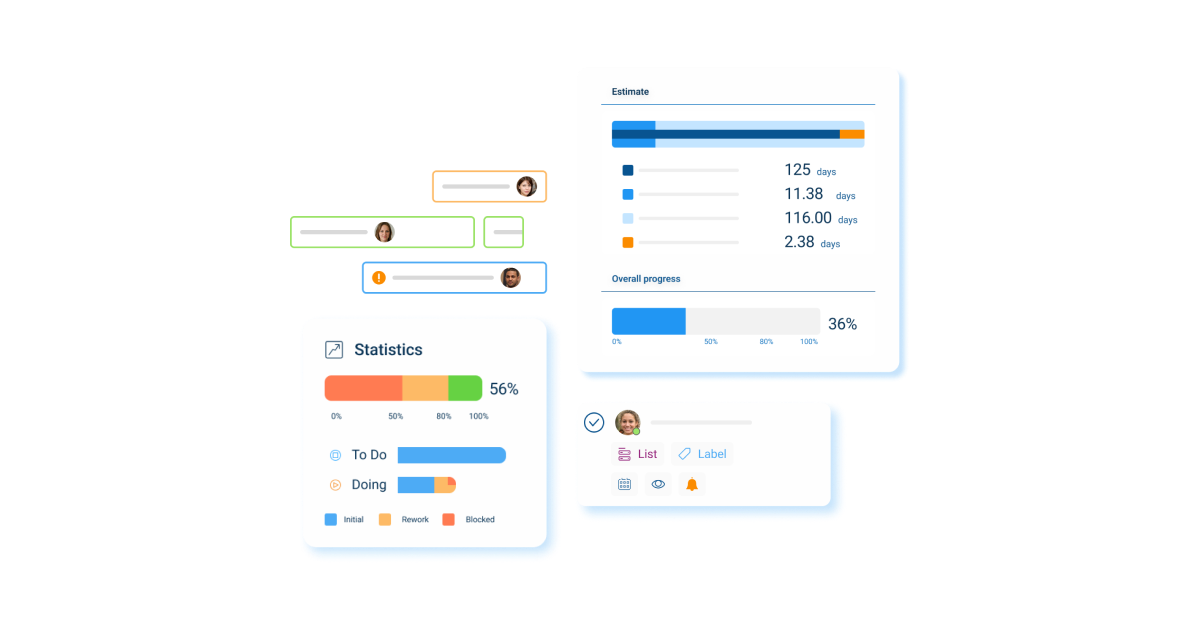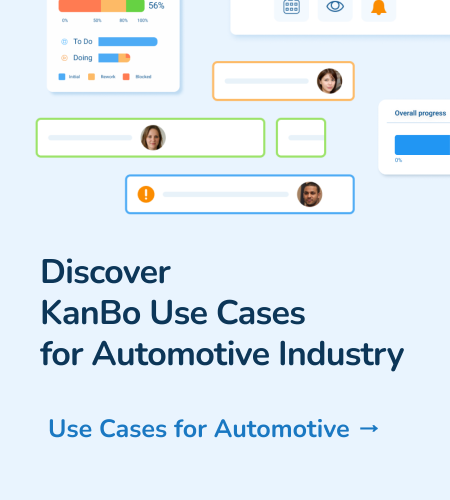Table of Contents
Work coordination platform
Designed for the automotive industry
As a leader in innovation, you understand the importance of staying ahead of the curve in the fast-moving automotive 4.0 world. KanBo provides you with the tools to do just that by facilitating smart factory operations, streamlining project management, fostering collaboration and solving complex problems.
KanBo: Mitigating Product Development Challenges in the Automotive Industry
Understanding the Challenge:
In the dynamic world of the automotive industry, the role of a product development engineer can be quite challenging, particularly in multifaceted corporations like Honda. The Sr. Engineer II in Product Development is responsible for managing intricate balancing acts, ensuring that the perspectives of customers, technicians, dealerships, and business stakeholders holistically fuse into new model development, thus reinforcing specifications based on data analysis, market trends, and business objectives. The overarching task of mitigating market occurrences and ensuring stakeholder perspectives are reflected throughout the project makes this a challenging role.
Solving the Challenge with KanBo:
KanBo’s dynamic features offer a comprehensive solution to counterbalance these challenges:
- Spaces: Construct individual spaces for each stakeholder's perspectives, ensuring organized and streamlined collaboration, and contributing to the development of products that meet everyone's expectations.

- Card: Represent each project, whether it’s new model development or customer feedback analysis, with individual cards to ensure disparate tasks remain manageable.

- Activity Stream: Track the chronological series of actions within projects in real-time, keeping all stakeholders updated about current task statuses, supporting transparency and collaboration.

- Card Blocker: Efficiently identify and manage potential issues blocking the progress of particular tasks, facilitating the proactive resolution of problems before they escalate.

- Workspace: Create a dedicated workspace for the entire product development process, ensuring all relevant data, tasks, and discussions are confined to one dedicated location for easy access and management.

- Card Status: Keep track of the development stages of each project, providing an overview of project progresses, and offering insights into areas that need attention.

The Expected Outcome:
Leveraging KanBo to tackle these complexities comprehensively will lead to a more organized, streamlined product development process in the automotive space dominated by constant pressure to innovate. This increases productivity and allows for a more efficient turn-around-time during the development process.
Long-term benefits may include faster decision-making, efficient plan execution leading to reduced time-to-market of new models, resulting in increased profitability. Furthermore, KanBo would foster a culture of transparency and accountability within the organization.
In the near future, KanBo could also be integrated with internal systems for more robust data analysis and trend prediction capabilities. With KanBo, the focus of product development engineers can shift towards innovation and excellence, ultimately delivering products that not only meet but exceed stakeholder expectations.

Table of Contents
Work coordination platform
Designed for the automotive industry
As a leader in innovation, you understand the importance of staying ahead of the curve in the fast-moving automotive 4.0 world. KanBo provides you with the tools to do just that by facilitating smart factory operations, streamlining project management, fostering collaboration and solving complex problems.
KanBo: Mitigating Product Development Challenges in the Automotive Industry
Understanding the Challenge:
In the dynamic world of the automotive industry, the role of a product development engineer can be quite challenging, particularly in multifaceted corporations like Honda. The Sr. Engineer II in Product Development is responsible for managing intricate balancing acts, ensuring that the perspectives of customers, technicians, dealerships, and business stakeholders holistically fuse into new model development, thus reinforcing specifications based on data analysis, market trends, and business objectives. The overarching task of mitigating market occurrences and ensuring stakeholder perspectives are reflected throughout the project makes this a challenging role.
Solving the Challenge with KanBo:
KanBo’s dynamic features offer a comprehensive solution to counterbalance these challenges:
- Spaces: Construct individual spaces for each stakeholder's perspectives, ensuring organized and streamlined collaboration, and contributing to the development of products that meet everyone's expectations.

- Card: Represent each project, whether it’s new model development or customer feedback analysis, with individual cards to ensure disparate tasks remain manageable.

- Activity Stream: Track the chronological series of actions within projects in real-time, keeping all stakeholders updated about current task statuses, supporting transparency and collaboration.

- Card Blocker: Efficiently identify and manage potential issues blocking the progress of particular tasks, facilitating the proactive resolution of problems before they escalate.

- Workspace: Create a dedicated workspace for the entire product development process, ensuring all relevant data, tasks, and discussions are confined to one dedicated location for easy access and management.

- Card Status: Keep track of the development stages of each project, providing an overview of project progresses, and offering insights into areas that need attention.

The Expected Outcome:
Leveraging KanBo to tackle these complexities comprehensively will lead to a more organized, streamlined product development process in the automotive space dominated by constant pressure to innovate. This increases productivity and allows for a more efficient turn-around-time during the development process.
Long-term benefits may include faster decision-making, efficient plan execution leading to reduced time-to-market of new models, resulting in increased profitability. Furthermore, KanBo would foster a culture of transparency and accountability within the organization.
In the near future, KanBo could also be integrated with internal systems for more robust data analysis and trend prediction capabilities. With KanBo, the focus of product development engineers can shift towards innovation and excellence, ultimately delivering products that not only meet but exceed stakeholder expectations.

